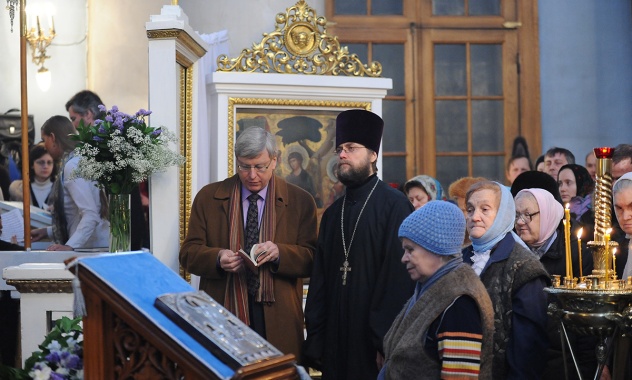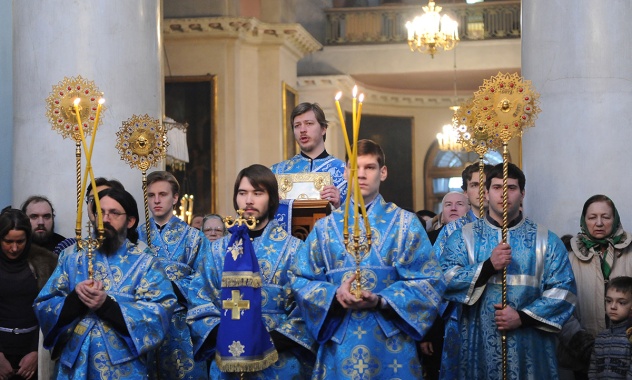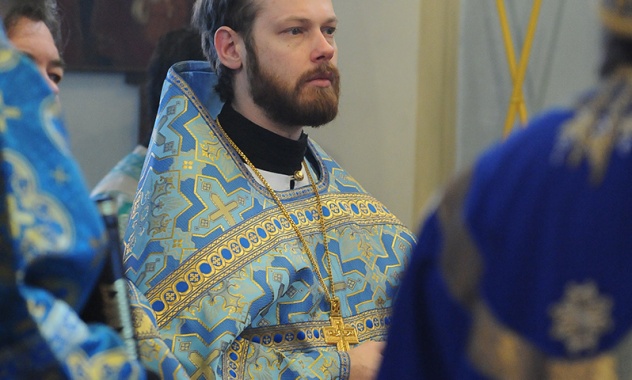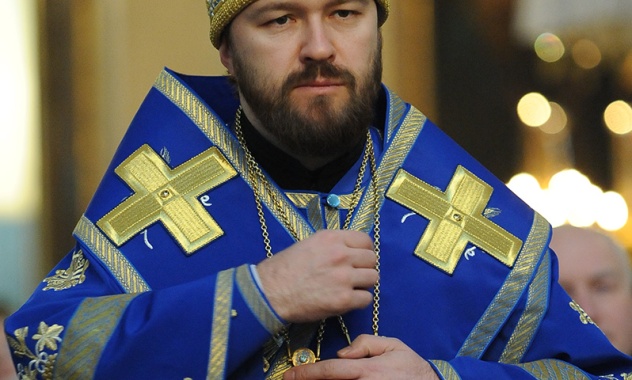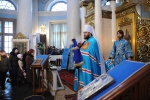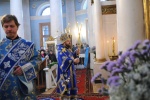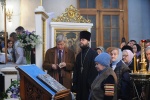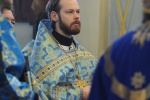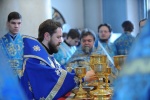Metropolitan Hilarion of Volokolamsk: Asking for forgiveness and receiving it is a necessary condition for one to begin the Lenten feat of repentance
On the Forgiveness Sunday on February 14, 2010, Metropolitan Hilarion of Volokolamsk, chairman of the Moscow Patriarchate department for external church relations, celebrated the Divine Liturgy in the Church of Our Lady the Joy to All the Afflicted.
After the service, His Eminence Hilarion delivered a sermon. Reminding the congregation that this year the Meeting of the Lord is celebrated on the Forgiveness Sunday, the archpastor said:
On the Day of the Meeting of the Lord, we commemorate the event which happened soon after the birth of the Lord Jesus Christ when the Most Holy Virgin the Mother of God and righteous Joseph brought the Divine Infant to the temple where they were welcomed by righteous Simon – the man who had served in the temple for many decades and received a promise that he would not die until he saw Christ the Saviour with his own eyes. And now righteous Simon took the Infant in his arms and said to Him the words we pronounce during our evening prayers: ‘Sovereign Lord, as you have promised, you now dismiss your servant in peace. For my eyes have seen your salvation’.
For the man who met the Saviour in his life the whole meaning of life was fulfilled, for our whole dwelling in this world is none other than the expectation of a meeting with the Lord. This ultimate meeting will take place when we will already cross the line separating us from the other world but already now, in this life. He gives us an opportunity to meet Him in prayer, in communion with God and especially in partaking Christ’s Holy Gifts, for every time we communicate we take in ourselves the Lord Saviour Himself, and our eyes, like the eyes of righteous Simon, contemplate the Saviour of the world. Every time when we, clergy, partake of the Holy Gifts in the sanctuary and take the Body of Christ in our arms, we remember the words which were voiced today: ‘I am not held by the old man; it is I Who hold him’. When we partake of the Body and Blood of Christ, what happens again is what we remember on the Day of the Meeting of Our Lord, namely, it is not us who hold the Lord within us but He take in His divine life; He brings us into the very depths of communion with Himself and we come into spiritual and bodily union with Him – this is the Meeting which takes place in the life of each of us; this is the meeting which is possible for us when we come to church.
Like the Most Holy Mother of God who took the Saviour of the world Himself, the Infant Jesus, into her, we take His Immaculate Body and His Honourable Blood into us. Like Saint Simeon, who held the Divine Infant Christ in his arms, we hold His Immaculate Body and Honourable Blood and through communion partake of eternal life. Our eyes contemplate the other world which exists parallel to this earthly world to which every one of us will go one after another, some earlier, others later, to meet Christ and one another.
The Holy Church keeps reminding us about this divine reality through feasts, Sacraments and Lent which begins tomorrow to last seven weeks. It will take us to the Feast of the Radiant Nativity of Christ when we will meet the Lord face to face, the risen Lord Who by His death has trampled upon human death.
The Lenten pursuit is a time for repentance. It is the time when the Church calls us to think over the meaning of our life, to look into ourselves and to see our unworthiness, insufficiency, helplessness and sinfulness and to bring to the God the appropriate fruits of repentance.
The Lenten journey begins on the Sunday, which is popularly called the Forgiveness Sunday. On this day, the old church tradition teaches us to forgive each other for our faults. But to ask for and receive forgiveness is a necessary condition for us to begin the Lenten feat of repentance.
Repentance is not merely repentance of one’s sins. We know that Judas repented when he betrayed the Lord, but his repentance was not saving for him because he did nothing to rectify his error; he did not repent before God but, conscious of his sin, fell into despair and committed suicide.
The Church calls us not only to repent of whatever sin we committed but also to change our attitude to life and to our neighbours and to correct our mistakes, especially the misdeeds we committed against others. We can rectify them by asking our neighbours for forgiveness”.
On the eve of Lent, Metropolitan Hilarion, speaking on behalf of the clergy of the Church of Our Lady the Joy to All the Afflicted of which he is rector, asked the parishioners for forgiveness:
First of all I ask you to forgive us, the clergy, who are not always equal to the service. We do not always find enough physical and spiritual resources to be attentive to your needs, to take each of you into our heart, to share the sorrows and joys of each of you. Our human resources are not enough to carry out the service entrusted to us, and divine grace comes to us but we not always feel it properly, not always fully commend ourselves to God’s hands and often rely only on our insufficient resources.
We ask your forgiveness and ask you to forgive each other. Let every one of us think on this day about those before whom we are guilty and who is guilty before us because forgiveness is a double process. First of all we should ask forgiveness from those whom we offended and those whom we injured voluntarily or involuntarily, those for whom we failed to show enough love, kindness and humbleness – the virtues which the Lord expects from us. In doing so, we should also forgive our offenders, those who voluntarily or involuntarily injured or offended us and those for whom we feel indignation, rancor or bitterness.
We should fully get rid of this burden in relations with other people so that in good faith and with peace in our hearts we may begin the Lenten journey.
After seasonal greetings His Eminence Hilarion expressed the wish that the congregation may come out of Lent spiritually renewed, pure in spirit and worthy of meeting our Risen Lord and Saviour Jesus Christ.
DECR Communication Service












